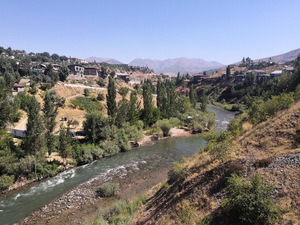Roughness coefficient: различия между версиями
Evg Fil (обсуждение | вклад) |
Evg Fil (обсуждение | вклад) |
||
| Строка 1: | Строка 1: | ||
| − | [[Файл:Mountain river.png|мини| | + | [[Файл:Mountain river.png|мини|Горная река]] |
==Коэффициент шероховатости== | ==Коэффициент шероховатости== | ||
Версия 00:36, 26 апреля 2024
Коэффициент шероховатости
Коэффициент, который характеризует шероховатость поверхности русла или трубы, вмещающей воду, и который учитывается при расчете сопротивления потока в русле или трубе.[1]
Определение на английском
Coefficient that characterizes the roughness of a water carrying channel or a pipe and which is taken into account when computing the resistance to flow in the channel or pipe.[1]
Numerical measure of the frictional resistance to flow in a river channel[2]
Пример использования на английском языке
In rivers, the most common calibration parameter is the roughness coefficient, that accounts for the friction term.[3]
The rock joint roughness coefficient (JRC) has been used for the estimation of the peak shear strength of rock joints[4]
The joint roughness coefficient (JRC), introduced in Barton (1973) represented a new method in rock mechanics and rock engineering to deal with problems related to joint roughness and shear strength estimation.[5]
Перевод на русский
В реках наиболее распространенным калибровочным параметром является коэффициент шероховатости, который учитывает коэффициент трения.
Коэффициент шероховатости стыка горных пород (JRC) был использован для оценки максимальной прочности стыков горных пород на сдвиг
Коэффициент шероховатости соединения (JRC), введенный Бартоном (Barton, 1973), представляет собой новый метод в механике горных пород и горной инженерии для решения проблем, связанных с оценкой шероховатости соединения и прочности на сдвиг.
Список литературы
- ↑ Перейти обратно: 1,0 1,1 WMO W.M.O., UNESCO U.N.E. and S.O. International Glossary of Hydrology. – 1998. – 461 с.
- ↑ Goudie A. Alphabetical Glossary of Geomorphology // International Association of Geomorphologists. – 2014. – № July. – С. 84.
- ↑ Ferreira D.M., Fernandes C.V.S., Kaviski E., Bleninger T. Calibration of river hydrodynamic models: Analysis from the dynamic component in roughness coefficients // Journal of Hydrology. – 2021. – Т. 598. – С. 126-136.
- ↑ Li Y., Zhang Y. Quantitative estimation of joint roughness coefficient using statistical parameters // International Journal of Rock Mechanics and Mining Sciences. – 2015. – Т. 77.
- ↑ Barton N., Wang C., Yong R. Advances in joint roughness coefficient (JRC) and its engineering applications // Journal of Rock Mechanics and Geotechnical Engineering. – 2023. – Т. 15. – № 12.
